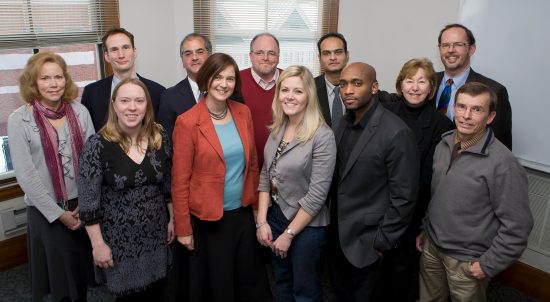|
|
Addictive personalities can take many forms: a depressed college student who uses drugs for motivation; a hepatitis C-infected heroin user; an alcoholic with uncontrolled diabetes; a chronic pain sufferer dependent on prescription narcotics. In an effort to help patients such as these who struggle with addiction in conjunction with additional psychiatric or medical disorders called comorbidities, the Department of Psychiatry at UMass Medical School and clinical partner UMass Memorial Medical Center have launched the Addiction and Comorbidity Treatment Services (ACTS).
The mission of ACTS is to provide comprehensive evaluation and treatment for patients with addictive disorders, both with and without other psychiatric or medical disorders. “ACTS is unique as the area’s only substance abuse facility housed at a major medical center,” said Gerardo Gonzalez, MD, associate professor of psychiatry and director of ACTS. “Having an established outpatient psychiatry clinic with a substance abuse treatment license allows us to serve the full array of patients with these problems.”
Anyone struggling with a drug or alcohol addiction is welcome at ACTS, which is located across the street from University Campus. Care is administered on an outpatient basis by a multi-disciplinary team including psychiatrists, social workers, psychologists and psychiatric nurse clinicians, all with specific addiction expertise.
Services include medication management for alcohol, tobacco and illicit substances, including buprenorphine (Suboxone) induction and maintenance for opiate dependency; medication management for co-occurring psychiatric disorders; opioid recovery and other addiction recovery groups; and individual counseling and psychotherapy, including treatment for co-occurring opioid addiction and chronic pain. ACTS also offers consultation to help primary care providers evaluate and manage their patients with substance abuse issues.
“Substance abuse is very prevalent in our society in all walks of life,” said Jacob Kagan, MD, assistant professor of psychiatry and ACTS clinician, underscoring that individuals seeking treatment might come to ACTS through a number of referral sources. “We receive referrals from primary care physicians, other mental health clinicians, emergency departments, even patients’ cardiologists, endocrinologists or oncologists,” added Monika Kolodziej, PhD, assistant professor of psychiatry and also an ACTS clinical psychologist. Referrals also come from UMass Memorial affiliate Community Healthlink, AdCare Hospital and Spectrum Health Systems, all of which are ACTS community partners and members of the Central Massachusetts Addiction Consortium, which Dr. Gonzalez and Dr. Kolodziej co-chair.
In addition to adding clinical capacity for the Worcester community, ACTS trains competent providers as part of its mission to improve substance abuse treatment. “We have psychiatry residents including a chief resident in addictions, and an addiction psychiatry fellowship,” said Gonzalez, who was recruited to be inaugural director of the fellowship and addiction psychopharmacology research by fellow addiction psychiatrist Douglas Ziedonis, MD, MPH, chair and professor of psychiatry. Trainees including medical students, psychology interns and psychiatry and family medicine residents have rotated through the clinic, and the Department of Psychiatry hopes more will do so in the future to learn about conditions and issues they will encounter in practice, no matter what their specialty.
With heroin use and non-medical use of prescription opioids among young adults on the rise, the ACTS team is hopeful that some ACTS patients may ultimately participate in clinical research underway at the UMMS Addiction Psychopharmacology Unit. Gonzalez is the principal investigator, and many ACTS team members are involved with, the young adult suboxone study funded by the National Institute of Drug Abuse. The study, entitled “Memantine-enhanced buprenorphine treatment for opioid dependent young adults,” seeks to develop an effective short-term alternative to long-term medication assisted maintenance for young adult patients, the age group that experiences the highest prevalence of opiate addiction and rates of relapse after current treatment for opiate addiction.
Reflecting the philosophy of about two dozen ACTS team members, clinical leaders, colleagues and community partners who attended an opening reception for the clinic in January, Gonzalez said, “It is a great coincidence that the acronym ACTS reflects our team’s commitment to act and participate in solving the problem of substance abuse that is affecting our community, especially our youth.”
